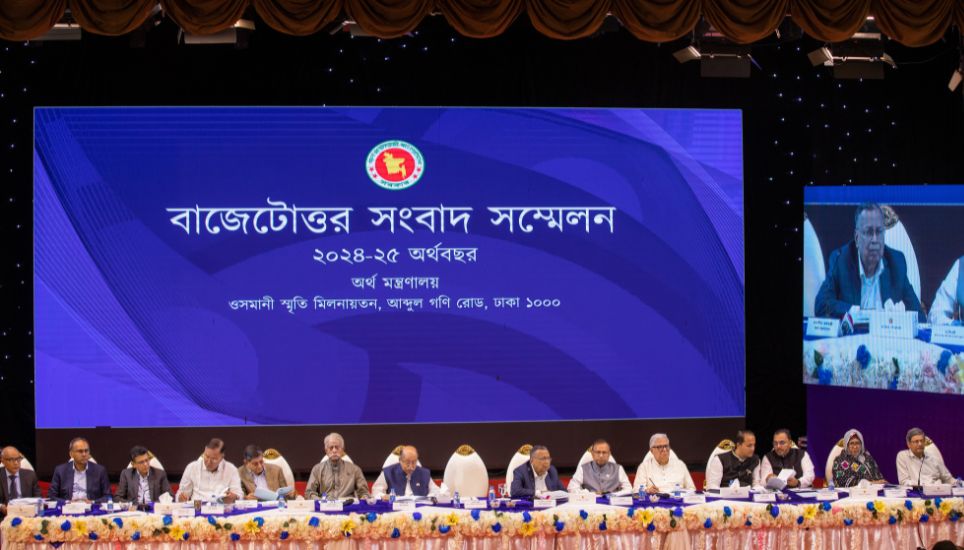Home ›› Economy ›› Budget FY25

Finance Minister Abul Hassan Mahmood Ali on Friday said the country must wait for six months to bring inflation under control.
Mahmood added that the government is doing everything in its power to curb inflation, and it will begin to decline by the end of this year, in line with the measures he took under a contractionary strategy in the proposed budget.
He continued, “We are trying, and expecting the inflation will be on a declining trend by the end of this year. You [journalists] already learned that we have reduced the budget growth compared to the previous trend in a bid to reduce pressure on prices.
“We, however, are aware of the GDP growth, and despite the contractionary strategic policy, we have set an aim to achieve 6.75 per cent growth in the upcoming fiscal year.”
Mahmood made the remarks while speaking at the post-budget press conference, held in the city’s Osmani Memorial Auditorium on Friday afternoon.
Persistent high inflation has been testing the lower and lower-middle-income consumer’s limit of living hand to mouth, and the rate has been hovering at 9.5 per cent – 10 per cent for the previous two years. Mahmood aims to bring the inflation down to 6.5 per cent in FY25.
Replying to a question, the finance minister said the government’s borrowing from the banks will neither impact the private sector, nor create a liquidity shortage. This is a normal issue, and every country is doing this.
Finance Division Secretary Md Khairuzzaman Mozumder said, “We know that the National Board of Revenue (NBR) would not meet his revenue collection target. That is why our budget deficit is higher, and we will have to borrow from the banks.
“But we are trying to increase the NBR’s capacity, and we believe that borrowing from banks will not impact our private sector.”
The proposed budget does not provide any new facilities on the capital market, and when journalists asked about this, NBR Chairman Muneem said, “We provide many tax facilities for the capital market, but is the market really growing?
“We have to generate revenue, and we cannot provide facilities to a sector year after year. I think the capital market’s actual problem is yet to be identified.”

Adding that the NBR is highly focused on revenue generation, Muneem said, “We imposed just 1 per cent duty for those items, which was zero. We do not want to see zero duty for any items.”
He was speaking at Friday’s post-budget brief organised by the finance ministry.
Present at the programme, State Minister of Finance Waseqa Ayesha Khan said, “We set a target to achieve $32 billion forex reserve in FY25, and the offshore deposit scheme will help us to achieve the goal, along with other tools.”
Mahmood Ali presented a Tk 7,97,000 crore proposal for FY25 to the nation in Parliament on Thursday, intending to build a prosperous, developed and smart Bangladesh. To meet the expenditure, he has to borrow Tk 2,56,000 crore from local and international lenders.
Of the total deficit, the domestic borrowing target is Tk 1,60,900, while Tk 1,37,500 crore will come from the local bank despite liquidity shortages.
He also plans to borrow over $7 billion from international lenders and development partners despite over $100 billion in existing foreign debt.
Interestingly, despite the government’s zero-tolerance slogan, Mahmood offered a controversial facility, allowing the whitening of undisclosed wealth on a “no questions asked” basis by paying only a 15 per cent tax, while the regular taxpayers pay up to 30 per cent.
Undisclosed money
In a response to the businesses and citizens, the proposed budget for FY25 allowed the whitening of undisclosed wealth on a “no questions asked” basis by paying only a 15 per cent tax, said National Board of Revenue (NBR) Chairman Abu Hena Md Rahmatul Muneem.
He, however, did not agree to define it as black money, and considered it as undisclosed wealth that unintentionally did not show up in the return, adding, “Black money never comes to the white market.
“Generally, almost all black money has been laundered or used for entertainment.”
Central Bank Governor Abdur Rouf Talukder was present at Friday’s press brief as well, but journalists boycotted him, as he banned journalists from doing professional duty at the central bank premises.
Generally, the central bank governor answered many questions in the post-budget press conference. But due to the boycott by the economic reporters, Rouf performed as an observer in about one-and-a-half-hour question-answer session.
The rest of the guests, however, participated in the question-answer session.
During the session, Finance Minister Mahmood Ali had lost his temper and asked journalists to study more.
When journalists asked him about providing amnesty on undisclosed money, planning to borrow from banks, imposing a duty on economic zones’ investments, and industries’ raw materials import, he said, “These are not questions. Please read first, and then ask questions.”